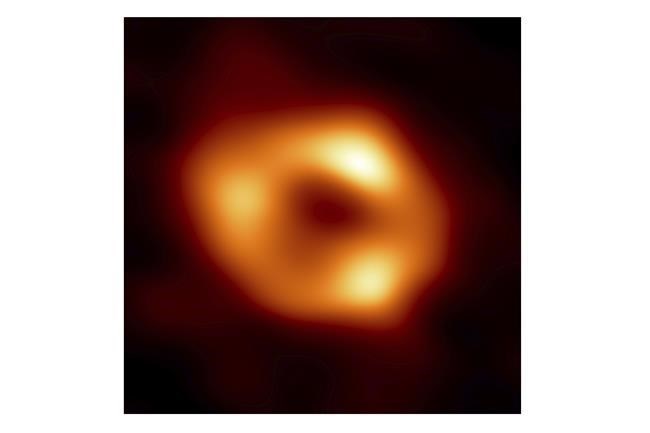
This image released by the Event Horizon Telescope Collaboration, May 12, 2022, shows a black hole at the center of our Milky Way galaxy. The Milky Way black hole is called Sagittarius A*, near the border of Sagittarius and Scorpius constellations.
Image Credit: (Event Horizon Telescope Collaboration via AP)
December 22, 2024 - 9:00 AM
NEW YORK (AP) — Scientists have spotted what appear to be two stars whipping around each other near the supermassive black hole at the center of our Milky Way galaxy.
Nearly every large galaxy has a supermassive black hole at its heart. The one in the middle of the Milky Way, called Sagittarius A (with an asterisk denoting star), is about 4 million times more massive than our sun and is relatively quiet, occasionally swallowing gas or dust that comes its way.
Scientists know stars can form near and even orbit these black hole behemoths, but they've never seen a pair of stars survive so close by.
The research was published Tuesday in the journal Nature Communications.
The celestial sighting is interesting and unusual, and more research is needed to be certain of what the objects are, said astrophysicist Anna Ciurlo with the University of California, Los Angeles.
“This leaves some questions still open,” said Ciurlo, who was not involved with the new research.
At about 2.7 million years old, the twin stars seem to be fairly young. Scientists said they appear to orbit each other at just the right distance: If they were too spread out, the black hole's gravity would rip them apart. Any closer and they'd merge into a single star.
Even so, the cosmic duo won't stay stable forever. They could meld into one eventually though the timing is uncertain, said study lead author Florian Peissker from the University of Cologne.
“We are actually in a really lucky situation,” he said. “We observed the system just in time.”
___
The Associated Press Health and Science Department receives support from the Howard Hughes Medical Institute’s Science and Educational Media Group. The AP is solely responsible for all content.
News from © The Associated Press, 2024